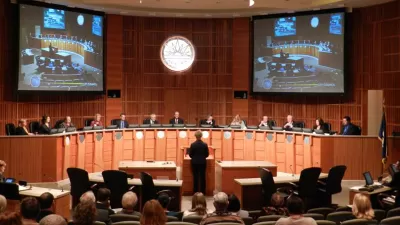Does giving short shrift to grassroots tradition cut against the dynamics of community-based decision-making?

Chuck Wolfe provides perspective on how Mercer Island, Washington—a small, leafy city between Seattle and Bellevue—recently reconstituted the city's Planning Commission in a way that arguably contradicts the dynamics of community-based decision-making, reducing local membership and substituting paid professionals who reside outside the city.
The change also raised concerns among some council members and residents about the implications of replacing residents with non-residents and paid practitioners to make community decisions. A petition, testimony, and letters in opposition stressed the unprecedented approach in the Puget Sound region.
In addition, Wolfe notes that planning commissions have a storied place in American history. Their hallmark was their grassroots composition—an early form of co-creation, a bridge between government and citizenry.
He outlined three concerns:
Will the involvement of non-resident practitioners lead to decisions that do not represent the community?
Will the council’s action weaken residents’ sense of ownership and civic responsibility for community planning?
Similarly, will the commission become disconnected from the local community and its contextual needs, compromising effectiveness and inclusivity?
He concludes that the city must remain mindful of retaining long-term resident wisdom and maximizing civic engagement:
While these forms of participation are often mandated by state law and local code, they need to be more than lip service and more like co-creation.
FULL STORY: Why 'Hack' a Planning Commission?

Planetizen Federal Action Tracker
A weekly monitor of how Trump’s orders and actions are impacting planners and planning in America.

Congressman Proposes Bill to Rename DC Metro “Trump Train”
The Make Autorail Great Again Act would withhold federal funding to the system until the Washington Metropolitan Area Transit Authority (WMATA), rebrands as the Washington Metropolitan Authority for Greater Access (WMAGA).

The Simple Legislative Tool Transforming Vacant Downtowns
In California, Michigan and Georgia, an easy win is bringing dollars — and delight — back to city centers.

The States Losing Rural Delivery Rooms at an Alarming Pace
In some states, as few as 9% of rural hospitals still deliver babies. As a result, rising pre-term births, no adequate pre-term care and "harrowing" close calls are a growing reality.

The Small South Asian Republic Going all in on EVs
Thanks to one simple policy change less than five years ago, 65% of new cars in this Himalayan country are now electric.

DC Backpedals on Bike Lane Protection, Swaps Barriers for Paint
Citing aesthetic concerns, the city is removing the concrete barriers and flexposts that once separated Arizona Avenue cyclists from motor vehicles.
Urban Design for Planners 1: Software Tools
This six-course series explores essential urban design concepts using open source software and equips planners with the tools they need to participate fully in the urban design process.
Planning for Universal Design
Learn the tools for implementing Universal Design in planning regulations.
Smith Gee Studio
City of Charlotte
City of Camden Redevelopment Agency
City of Astoria
Transportation Research & Education Center (TREC) at Portland State University
US High Speed Rail Association
City of Camden Redevelopment Agency
Municipality of Princeton (NJ)





























